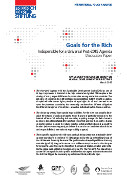Published on Thu, 2015-03-19 16:39
Spurred by the accelerated pace of globalization, and the rise and dominance of multinational and state-owned enterprises over the last few decades, scholars around the world researched many key industrial sectors and exposed the human rights consequences of our multi-faceted economic life. Today, we know the human rights consequences of resource extraction, as well as production, distribution, consumption and disposal of goods. We know how cross-border investments and trade facilitate those economic activities, and the human rights consequences to home and host countries and their citizens. We know the role that finance plays in investments and trade and how finance can both violate people’s human rights and help them realize their human rights. Several past financial crises, especially the most recent one, invited much scrutiny on the failure of the global financial system to pay attention to human rights consequences of its excesses. So it is none too soon that the United Nations’ Environmental Programme’s Inquiry into the Design of a Sustainable Financial System (the Inquiry) is asking about the role that human rights play in the design of a sustainable financial system. |
Published on Wed, 2015-03-18 09:59
The Civil Society Reflection Group on Global Development Perspectives today launches its latest Discussion Paper. "Goals for the Rich - Indispensable for a Universal Post-2015 Agenda" deals with the question of how a fair sharing of costs, responsibilities and opportunities among and within countries can be achieved in formulating and implementing a Post-2015 Sustainability Agenda. The Civil Society Reflection Group on Global Development Perspectivestoday launches its latest Discussion Paper. "Goals for the Rich - Indispensable for a Universal Post-2015 Agenda" deals with the question of how a fair sharing of costs, responsibilities and opportunities among and within countries can be achieved in formulating and implementing a Post-2015 Sustainability Agenda. |
Published on Tue, 2015-03-17 08:13
The ITUC has described an announcement by the United Nations gender body UN Women of a partnership with the Uber company to “create” a million jobs for women as undermining the very principles of the United Nations. Uber has come under fire in countries around the world for undermining incomes and working conditions of women and men who drive taxis for a living, and faced a string of accusations of union-busting, breaches of privacy, and risks to health and safety. |
Published on Fri, 2015-03-13 18:57
An interesting report named “Illicit financial flows, human rights and the post-2015 development agenda” has been submitted to the Human Rights Council on 9 March 2015 under the agenda item “Promotion and protection of all human rights, civil, in political, economic, social and cultural rights, including the right to development”. The report outlines how illicit financial flows undermine the enjoyment of economic, social, cultural, civil and political rights and emphasizes the need for political action. |
Published on Fri, 2015-03-13 18:35
The UN Statistical Commission discussed the challenges of the Post-2015 Development Agenda. This included implementation, measuring or monitoring progress as well as accountability. This includes a pragmatic look at the available data and implications for the Sustainable Development Goal indicators. Linkages between different agendas being negotiated in parallel such as Financing for Development, Post-2015 and Climate were starkly noticeable. The 46th session of the Statistical Commission was held at the United Nations Headquarters, New York from 3 to 6 March 2015. The Commission attempted to tackle the issue of data in support of the post-2015 development agenda. |
SUSCRIBE TO OUR NEWSLETTER







